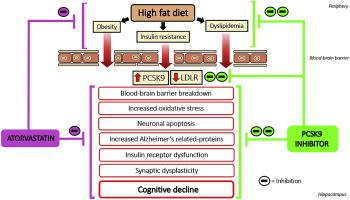Archives of Biochemistry and Biophysics ( IF 3.9 ) Pub Date : 2020-06-24 , DOI: 10.1016/j.abb.2020.108470 Busarin Arunsak 1 , Wasana Pratchayasakul 1 , Patchareeya Amput 1 , Kenneth Chattipakorn 2 , Theetouch Tosukhowong 2 , Sasiwan Kerdphoo 2 , Thidarat Jaiwongkum 2 , Chanisa Thonusin 1 , Siripong Palee 2 , Nipon Chattipakorn 1 , Siriporn C Chattipakorn 3

|
The accumulation of lipid as a result of long-term consumption of a high-fat diet (HFD) may lead to metabolic and brain dysfunction. Atorvastatin, a recommended first-line lipid-lowering agent, has shown beneficial effects on metabolic and brain functions in several models. Recently, proprotein convertase subtilisin/kexin type 9 (PCSK9) inhibitor was approved as an effective therapeutic drug for dyslipidemia patients. However, few studies have reported on the effect of this PCSK9 inhibitor on brain function. In addition, the comparative efficacy on the improvement of metabolic and brain functions between PCSK9 inhibitor and atorvastatin in obese models have not been elucidated. We hypothesized that PCSK9 inhibitor improves metabolic and brain functions in an obese model to a greater extent than atorvastatin. Thirty-two female rats were fed with either a normal diet (ND) or HFD for 15 weeks. At week 13, ND rats were given normal saline and HFD rats were given either normal saline, atorvastatin (40 mg/kg/day) or PCSK9 inhibitor (4 mg/kg/day) for 3 weeks. Oxidative stress, blood brain barrier breakdown, microglial hyperactivity, synaptic dysplasticity, apoptosis, amyloid proteins production in the hippocampus and cognitive decline were found in HFD-fed rats. Atorvastatin and PCSK9 inhibitor therapies equally attenuated hippocampal apoptosis and amyloid protein production in HFD-fed rats. Interestingly, PCSK9 inhibitor had the greater efficacy than atorvastatin on the amelioration of hippocampal oxidative stress, blood brain barrier breakdown, microglial hyperactivity, synaptic dysplasticity in the hippocampus and cognitive decline. These findings suggest that PCSK9 inhibitor may be another drug of choice for improving brain function in the obese condition with discontinued statin therapy.
中文翻译:

前蛋白转化酶枯草杆菌蛋白酶/ kexin 9型(PCSK9)抑制剂在肥胖大鼠的脑功能和认知改善方面比阿托伐他汀具有更大的功效。
长期食用高脂饮食(HFD)导致的脂质堆积可能导致代谢和脑功能障碍。阿托伐他汀是一种推荐的一线降血脂药,已在多种模型中显示出对代谢和脑功能的有益作用。最近,前蛋白转化酶枯草杆菌蛋白酶/ kexin 9型(PCSK9)抑制剂被批准为血脂异常患者的有效治疗药物。但是,很少有研究报道这种PCSK9抑制剂对脑功能的影响。此外,尚未阐明在肥胖模型中改善PCSK9抑制剂和阿托伐他汀之间代谢和脑功能的比较功效。我们假设PCSK9抑制剂在肥胖模型中比阿托伐他汀能更好地改善代谢和脑功能。32只雌性大鼠用正常饮食(ND)或HFD喂养15周。在第13周,为ND大鼠提供生理盐水,为HFD大鼠提供生理盐水,阿托伐他汀(40 mg / kg /天)或PCSK9抑制剂(4 mg / kg /天),持续3周。在喂食HFD的大鼠中发现了氧化应激,血脑屏障破坏,小胶质细胞过度活跃,突触发育异常,细胞凋亡,海马淀粉样蛋白产生和认知能力下降。阿托伐他汀和PCSK9抑制剂疗法同样减弱了由HFD喂养的大鼠的海马凋亡和淀粉样蛋白的产生。有趣的是,PCSK9抑制剂在改善海马氧化应激,血脑屏障破坏,小胶质细胞过度活跃,海马突触发育异常和认知能力下降方面比阿托伐他汀具有更大的功效。


























 京公网安备 11010802027423号
京公网安备 11010802027423号